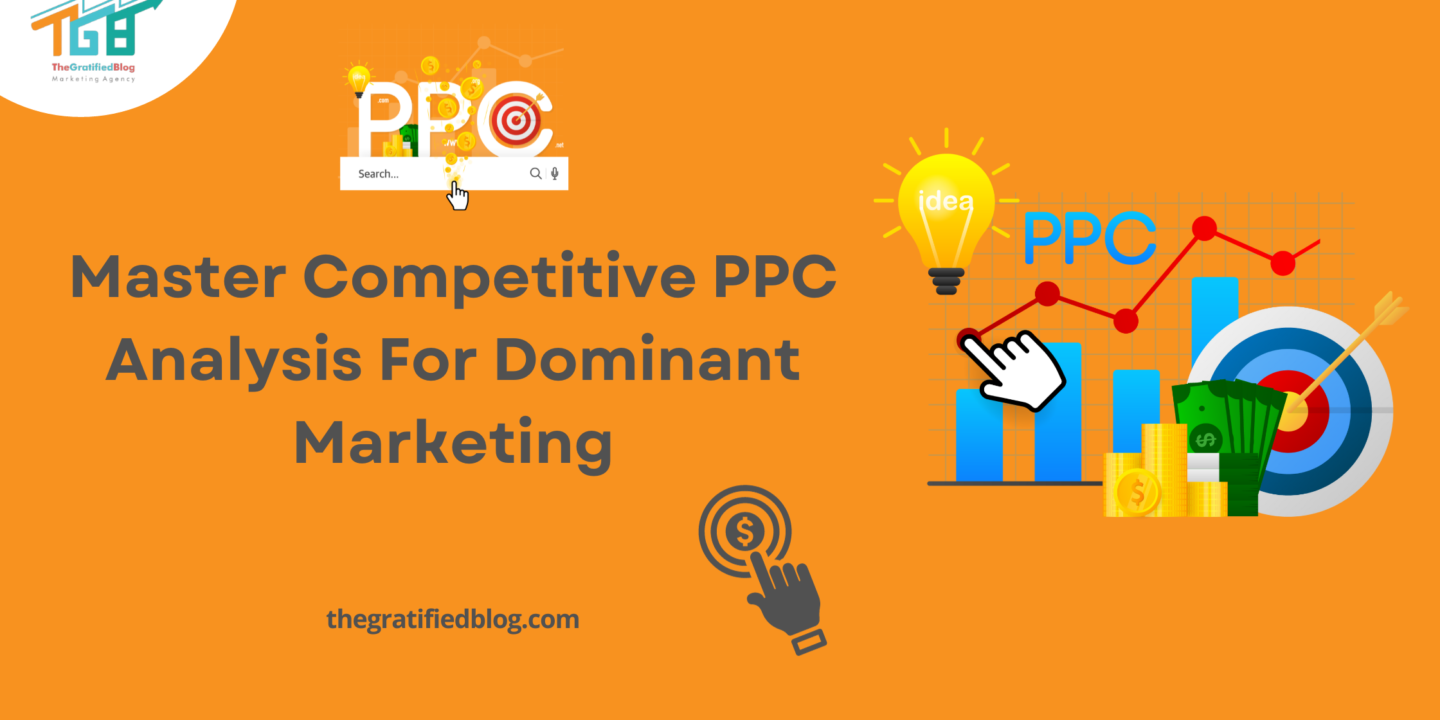
In the fast-paced world of digital marketing, remaining at the forefront is more than just a goal; desire – it’s a necessity. As businesses compete for online visibility and customer attention, mastering the art of Competitive PPC analysis is your ticket to success.
If you’re looking to unlock the potential of your Pay-Per-Click (PPC) advertising campaigns, understanding the intricacies of Competitive PPC analysis is the key.
In this blog, we’ll delve into the intricacies of Competitive PPC Analysis, discussing its definition and significance. We’ll unravel why PPC Analysis is vital in the digital marketing landscape. We’ll also guide you through the essential process of Identifying Your PPC Competitors and then embark on an enlightening journey through the Step-By-Step process of Competitive PPC Analysis. To ensure a comprehensive understanding, we’ll address Frequently Asked Questions (FAQs) and conclude with a synthesis of the key takeaways.
Let’s dive into the dynamic world of Competitive PPC analysis and take your digital marketing strategies to the next level.
So, let’s get started by understanding it:
What Is Competitive PPC Analysis?
Competitive PPC analysis, as the name suggests, is the process of analyzing the advertising strategies and campaigns of your competitors in the PPC landscape.
It involves assessing their keywords, ad copy, budget allocation, landing pages, and overall performance. By gaining insights into your competitors’ tactics, you can fine-tune your PPC campaigns and make data-driven decisions for more tremendous success.
Why PPC Analysis Is Important?
The significance of PPC analysis cannot be overstated, and there are several compelling reasons for its importance.
Here are a few key factors to consider:
- Staying Competitive: In the cutthroat landscape of modern business, staying competitive is non-negotiable. To maintain your edge in the industry, it’s essential to keep a close eye on your competitors. Analyzing their PPC strategies can reveal valuable insights, helping you spot opportunities and areas in your campaigns that need improvement.
- Budget Optimization: Your advertising budget is a precious resource, and knowing how to allocate it effectively is a game-changer. Understanding your competitors’ spending habits and strategies empowers you to make more informed decisions. You can concentrate your budget on areas where you have a competitive advantage while cutting back on less effective keywords or platforms.
- Enhancing Ad Relevance: Ad relevance is a critical component in determining the success of your PPC campaigns. By scrutinizing your competitors’ ad copy and landing pages, you can gain inspiration to create more compelling and relevant ads. The result? Higher click-through rates and improved Quality Scores, which, in turn, lead to lower costs per click.
- Gaining Keyword Insights: Keywords are the foundation of your PPC campaigns. Discovering the keywords your competitors are targeting can be a goldmine of information. It not only helps you identify high-value keywords that you might have overlooked but also allows you to uncover negative keywords. Eliminating irrelevant keywords can save you money and elevate the overall relevance of your ads.
- Adapting to Market Changes: The digital world is in constant flux. To stay ahead, you need to be agile and responsive. By diligently monitoring your competitors, you can adapt to changes in the market landscape. This includes staying attuned to developments like new product launches, evolving marketing trends, and shifts in consumer behavior.
Now that you’ve grasped the significance of PPC analysis let’s delve into the process of identifying your PPC competitors.
How To Know Your PPC Competitors?
Identifying your PPC competitors is the first step in competitive analysis. Here are four steps to help you identify who you’re up against:
- Google Search: Start by conducting a simple Google search using relevant keywords related to your business or industry. Take note of the ads at the top of the search results. These are likely your PPC competitors.
- Use PPC Tools: There are various PPC analysis tools available, such as SEMrush, SpyFu, and Ahrefs, which can provide a list of your top PPC competitors. These tools can also give you insights into their ad spend, ad copy, and keywords.
- Social Media: Check out your competitors’ social media profiles and see if they run paid advertising campaigns on platforms like Facebook, Instagram, or Twitter. This can help you identify competitors that may not appear in search engine results.
- Competitor Websites: Visit competitors’ websites and look for any banners, ads, or calls to action that may lead to PPC campaigns. Analyzing their landing pages can provide valuable insights into their strategies.
With a clear understanding of identifying your PPC competitors, let’s explore the systematic steps in conducting a comprehensive competitive PPC analysis.
How To Do Competitive PPC Analysis – Step-By-Step
Once you’ve identified your PPC competitors, it’s time to dive into the analysis.
Here’s a concise summary of the stages encompassed in competitive PPC analysis:
Keyword Analysis
The initial stage of competitive PPC analysis revolves around comprehensively exploring the keywords your competitors have chosen for their campaigns. This in-depth examination allows you to unearth high-performing keywords that could hold relevance for your business.
By gaining insights into their selection of keywords, you gain the power to fine-tune your keyword strategy, ensuring that your campaigns are in perfect harmony with the most potent search terms and phrases pertinent to your industry. This step, while seemingly straightforward, sets the stage for optimizing your campaign’s keyword arsenal for maximum impact and relevance.
Ad Copy Evaluation
Next, focus on analyzing the ad copy used by your competitors. Pay close attention to the quality of their headlines, ad extensions, and unique selling points. Additionally, take note of any special promotions or offers they are running.
This evaluation provides insights into the messaging strategies connecting with your intended audience in a way that enables you to craft more compelling and competitive ad copy for your campaigns.
Landing Page Review
After scrutinizing the ad copy, focus on the landing pages linked to your competitors’ ads. Here, your objective is to assess the landing page’s design, layout, and the clarity of the call-to-action.
This evaluation is pivotal in determining how these landing pages harmonize with the ad copy. Ensuring a seamless user experience between the ad and the landing page can significantly enhance your chances of achieving higher conversion rates and, ultimately, the overall success of your campaign.
Ad Position And Bidding Strategies
Examining where your competitors intend to position their ads is another vital evaluation component. Your task is to identify the specific ad positions they strive for within search results.
Furthermore, it’s imperative to delve into their bidding strategies, providing insights into their budget management techniques. Pay attention to whether they employ bidding adjustments, such as location or device targeting, as these strategies can be instrumental in securing a competitive advantage.
Ad Extensions And Features
Elevating ad visibility and boosting click-through rates hinges on your ability to investigate and leverage the ad extensions and features that your competitors are employing. These enhancements can encompass a range of elements, such as sitelinks, callout extensions, or price extensions.
By gaining insights into which extensions prove most effective for your competitors, you can emulate these practices and enhance the overall performance of your ads.
Performance Metrics
Lastly, it’s crucial to maintain a vigilant watch over essential performance metrics, which encompass the click-through rate (CTR), conversion rate, and the cost associated with each conversion. These metrics serve as valuable barometers, offering critical insights into the comprehensive effectiveness of your competitors’ campaigns.
By consistently monitoring and analyzing these data points, you position yourself to make well-informed decisions and adjust your strategies to optimize your campaigns for superior results.
Now, let’s explore the top 5 indispensable tools for conducting in-depth Competitive PPC analysis.
Top 5 Tools For Competitive PPC Analysis
To streamline your competitive PPC analysis, you can leverage various tools designed for this purpose.
Here are five top tools that can help you gain a competitive edge:
- SEMrush: SEMrush is a comprehensive SEO and PPC tool that provides data on competitors’ keywords, ad copy, and spending. It also offers insights into ad performance and keyword rankings.
- SpyFu: SpyFu is known for its competitive intelligence features. It allows you to uncover your competitors’ most profitable keywords and track their historical PPC campaigns.
- Ahrefs: Ahrefs is primarily an SEO tool, but it also offers competitive analysis for PPC. You can use it to identify your competitors’ backlinks, keywords, and ad copy.
- AdGooroo: AdGooroo is a PPC intelligence platform that offers competitive analysis and reporting. It provides information on ad spend, ad performance, and competitive insights.
- iSpionage: iSpionage is a tool that focuses on competitive PPC analysis. It lets you track your competitors’ keywords, ad copy, and landing pages. It also provides historical data for comparison.
FAQs
Q1. Is competitive PPC analysis only for large businesses?
A. No, competitive PPC analysis is valuable for businesses of all sizes. Small businesses can benefit from identifying and emulating successful strategies larger competitors use.
Q2. How often should I perform competitive PPC analysis?
A. It’s advisable to conduct competitive analysis regularly, ideally on a monthly or quarterly basis, to stay updated with changing market dynamics.
Q3. Can I use the insights from competitive PPC analysis to improve my SEO strategy?
A. Yes, many insights gained from competitive PPC analysis, such as keyword research and ad copy optimization, can be applied to enhance your SEO efforts.
Conclusion
Now that you’ve gained a comprehensive understanding of PPC analysis and its myriad facets, you might wonder why your competitors sometimes outshine you in search engine rankings. The solution lies in embarking on your competitive analysis journey without delay. By doing so, you can unlock the transformative potential of PPC for your business.
Initiate this journey today and witness firsthand how it can revolutionize your business in Pay-Per-Click advertising.
If you still have any questions related to the blog, then feel free to leave your questions in the comments section. We are here to address any questions you may have.
Thanks for reading 🙂








No Comments